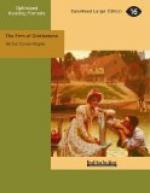“You should give up this shocking habit of drinking,” Mr. Girdlestone said seriously. “It is a waste of the best gifts with which Providence has endowed us. You are the worse for it both in this world and in the next.”
Captain Hamilton Miggs did not seem to be at all impressed by this very sensible piece of advice. On the contrary, he chuckled boisterously to himself, and, slapping his thigh, expressed his opinion that his employer was a “rum ’un”—a conviction which he repeated to himself several times with various symptoms of admiration.
“Well, well,” Girdlestone said, after a short pause, “boys will be boys, and sailors, I suppose, will be sailors. After eight months of anxiety and toil, ending in success, captain—I am proud to be able to say the words—some little licence must be allowed. I do not judge others by the same hard and fast lines by which I regulate my own conduct.”
This admirable sentiment also failed to elicit any response from the obdurate Miggs, except the same manifestations of mirth and the same audible aside as to the peculiarities of his master’s character.
“I must congratulate you on your cargo, and wish you the same luck for your next voyage,” the merchant continued.
“Ivory, an’ gold dust, an’ skins, an’ resin, an’ cochineal, an’ gums, an’ ebony, an’ rice, an’ tobacco, an’ fruits, an’ nuts in bulk. If there’s a better cargo about, I’d like to see it,” the sailor said defiantly.
“An excellent cargo, captain; very good indeed. Three of your men died, I believe?”
“Ay, three of the lubbers went under. Two o’ fever and one o’ snake-bite. It licks me what sailors are comin’ to in these days. When I was afore the mast we’d ha’ been ashamed to die o’ a trifle like that. Look at me. I’ve been down wi’ coast fever sixteen times, and I’ve had yellow jack an’ dysentery, an’ I’ve been bit by the black cobra in the Andamans. I’ve had cholera, too. It broke out in a brig when I was in the Sandwich Island trade, and I was shipmates wi’ seven dead out o’ a crew o’ ten. But I ain’t none the worse for it—no, nor never will be. But I say, gov’nor, hain’t you got a drop of something about the office?”
The senior partner rose, and taking a bottle from the cupboard filled out a stiff glass of rum. The sailor drank it off eagerly, and laid down the empty tumbler with a sigh of satisfaction.
“Say, now,” he said, with an unpleasant confidential leer, “weren’t you surprised to see us come back—eh? Straight now, between man and man?”
“The old ship hangs together well, and has lots of work in her yet,” the merchant answered.
“Lots of work! God’s truth, I thought she was gone in the bay! We’d a dirty night with a gale from the west-sou’-west, an’ had been goin’ by dead reckonin’ for three days, so we weren’t over and above sure o’ ourselves. She wasn’t much of a sea-going craft when we left England, but the sun had fried all the pitch out o’ her seams, and you might ha’ put your finger through some of them. Two days an’ a night we were at the pumps, for she leaked like a sieve. We lost the fore topsail, blown clean out o’ the ringbolts. I never thought to see Lunnon again.”




